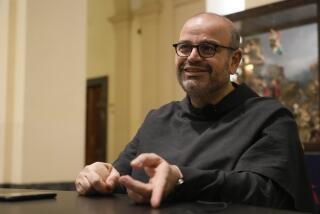They’re Keeping the Faith in Cyberspace
- Share via
MENLO PARK, Calif. — About 500 of the faithful filed into a quaint neighborhood church here recently to spread the Word. The word of the World Wide Web, that is.
“Why is it that cyberspace needs to be owned by those who only know dragons and Dracula and blood and horror and daggers?” Lars Dunberg, an imposing man with a fire-and-brimstone delivery, thundered from the altar. “I pray for the day that churches will evangelize using the new technology.”
It was to bring that day closer that Menlo Park Presbyterian’s mahogany pews were nearly filled for “Faith On-Line: Christians in the World of Interactive Computing,” a daylong conference where religious leaders preached about the power of the Internet--and especially the opportunity it offers to spread the Word.
The event drew a mostly older and nontechnical crowd, curious about the Internet and needing basic information.
“I am trying to catch up to my son,” said Anna Szabo, a graphic designer who made the 40-plus-mile journey from Pleasant Hill with her pastor.
“I’ve never been on the Internet,” said Carolyn Fick, children’s director for the Orchid Community Church of the Nazarene in Santa Maria. “I wanted to learn how to find Christian things for my children on it.”
“Interactive 101,” a workshop run by Steve Hewitt, editor of Christian Computing, a monthly magazine with a circulation of 100,000 that operates out of Raymore, Mo., was among the most popular of the day. The former Baptist minister, with his flaming red hair, a flashy suit and bright red suspenders, held the room in his sway with talk of browsers and Internet service providers. “Once a preacher, always a preacher,” Hewitt said, laughing.
Dunberg, the executive director of Living Bibles, a nonprofit foundation established in 1807 to publish and distribute Bibles in “every possible and impossible language,” called the Internet “the greatest technological revolution since the printing press.” Living Bibles has a page on the World Wide Web, the multimedia part of the Internet, where Bibles in more than a dozen languages can be ordered.
Historically, Christians have often been among the first to adopt new technology. The Gutenberg press was first used to print the Bible in the mid-1400s, and the mass-produced Bibles were a driving force in the Protestant Reformation. More recently, religious programming was a staple of early radio and television broadcasts.
Today, hundreds of Christian activists have turned the Web into a virtual ministry. Enter the word “Christian” into the Yahoo! Internet search directory and a page of listings appears, with sites by groups ranging from the Amish to the Jehovah’s Witnesses and the Moravian Church. There are 210 listings for Catholicism alone, among them the Vatican home page. The Rev. Jerry Falwell’s Thomas Road Baptist Church in Lynchburg, Va., has its own site, boasting of 3,146 online visitors to date and advertising an upcoming trip to Israel with Falwell.
But many Christian technophiles say church leaders are often uneasy with the unruly nature of the Internet. After all, it allows anyone who can program in the simple language known as HTML to set up a ministry.
“The church hierarchy sees this as a loss of control,” said Christian Computing’s Hewitt. Anyone can set up a site and look official.”
Recently in France, there was something of an uproar when an insubordinate left-wing Catholic bishop--banished by the Vatican to a long-abandoned diocese in Algeria--decided to move his domain from the African desert to the Internet.
And there are other worries about the online world--such as temptation.
“You can fall so head-over-heels online,” warned Pete Holzmann, a consultant for missionary organizations, during the workshop “On-line Relationships.”
“There’s a co-worker in an office across the country and you become friendly,” Holzmann said. “You begin telling them intimate things that you wouldn’t face-to-face. It’s safe until that person shows up in town and your marriage is destroyed.”
Most speakers at the conference, however, seemed more tolerant of online smut than the U.S. government, which recently made it a crime to transmit “indecent” material over computer networks.
“I think [the new law] is largely unenforceable because of the nature of the Internet,” said Jason Rippetoe, a computer integrator who led the session “Making the Internet Safe for Families and Kids.” “The first line of defense in any situation should be parents.”
Jack Sculley, son of former Apple Computer chief John Sculley and perhaps the closest thing to a Silicon Valley celebrity at the event, said Christians need to lobby for morally uplifting content to balance the mountains of violent, nihilistic offerings geared at “cyberpunks.”
“We call what we do covert Christian,” said Sculley, who with his wife runs a small multimedia company called Seismic Entertainment. “I’m a big fan of C.S. Lewis, but ‘The Chronicles of Narnia’ weren’t overtly evangelical. We didn’t want to hit people over the head. We’re trying to expose people to the beauty of creation to counter all the kill-or-be-killed stuff.”
Julie Pitta can be reached at pittaj@aol.com






